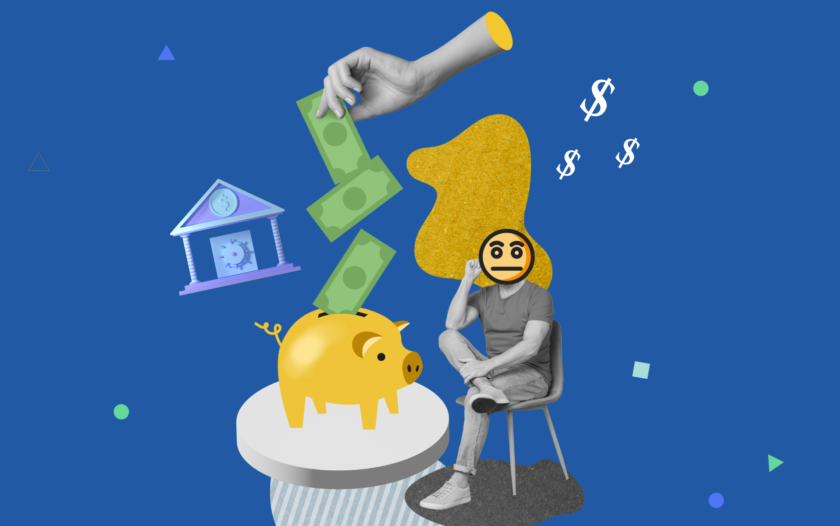Scared of Bank Failures? Here’s the Best Strategies for Protecting Your Cash
About Anouare
Anouare is a seasoned writer, editor and content strategist who started her career as a lifestyle journalist before stepping into leadership roles at publications such as AskMen and Goalcast. From editorial strategy to content marketing and project-management, she has tackled various challenges in digital media and discovered her passion for mentoring others in the process. She loves a good money mindset book and believes you can create your dream lifestyle by being yourself.
Read full bio
The collapse of Silicon Valley Bank – and two other small- to -mid-size U.S. banks – in March 2023 has made some people wonder whether their money is truly safe in their bank account.
A Morning Consult analysis revealed that 16% of U.S. adults said they moved their money as a direct result of the failures of Silicon Valley Bank and Signature Bank and the collapse of Silvergate Capital. Out of those people, 36% chose to move their money to a national bank.
However, it’s important to note that not everyone moved their funds out of panic – some consumers saw opportunities in the crisis, including the opportunity to diversify their bank accounts.
You may be wondering whether to follow suit and how to keep your cash in the event of future bank catastrophes. Here’s what you need to know to safeguard your money.
Trust in national banks remains steady
If you’re worried about the banking system’s stability, know that while bank failures like the ones that happened in March are possible, they are less likely to happen in bigger banks. This aligns with consumer sentiment data reported by Morning Consult – nearly a quarter of U.S. adults (22%) said national banks are the safest place to keep money right now. Additionally, seven in 10 Americans still trust banks. So, if you are currently a client of a national banking provider there is no reason to suddenly switch banks.
$5,300
is the median bank account balance, according to the latest SCF data, the average — or mean — balance is actually $41,600.


Diversifying is still a smart move
That said, diversifying where you keep your funds is still a good idea. First, there’s the fact that the Federal Deposit Insurance Corporation protects deposits up to $250,000 per account per bank. Any money over that limit is not protected, so if you are growing your net worth and getting close to that point, it’s a good idea to have more than one bank account. Some companies, like StoneCastle Cash Management, MaxMyInterest and IntraFi Network, specialize in helping customers spread their cash and stretch that limit.
Additionally, you want to avoid having your money tied up in one place, says The Moneyist columnist Quentin Fottrell: “The one thing that protects your money against stock-market turbulence, banking crises, real-estate crashes, and Ponzi schemes (not to further worry you) is diversification. Uncertain times provide a timely reminder to park your wealth in different places.”
With rising inflation, you want to make sure that your money is working for you, too. Keeping too much cash in a checking account is a personal finance no-no. You want a healthy amount of cash flow to manage your monthly expenses with a buffer, but anything more than that should be helping you receive returns.
If you want to get more organized with your money, whether you have it in a national bank or a small chain, consider MyCredello to help you get in better financial shape. Organize your debts, get payment reminders and link your accounts easily.
Where to park your cash
According to Fottrell, savings accounts are good safe havens in a high interest-rate environment. Consider a HYSA (High-Yield Savings Account). According to Investopedia, the interest rates on high-yield savings accounts can be 10 to 12 times higher than traditional savings account returns, with online banks offering the most competitive rates.
A certificate of deposit (CD) account can also be interesting, though it will lock your money in for a certain amount of time so you will want to keep some cash elsewhere for liquidity purposes. It’s basically a savings account that holds a certain amount of money for a fixed period of time, and, in exchange, the bank pays you interest.
Buying stocks and bonds can help you grow your net worth as well, whether you work with an advisor or use something like Wealthsimple to automate the process or learn how to invest. Again, diversification is key – even within your portfolio.
It’s also important to avoid taking your money out of your portfolio in a depressed market, adds Fottrell: “It’s usually a mistake to try to time the market, or panic in a down market. Just make sure you have enough cash for an emergency fund, including a job loss or medical emergency, and for big-ticket purchases like a home.”
Bottom line
Don’t use what happened with Silicon Valley Bank as a reason to hide envelopes of cash under your bed. It won’t keep your money safe nor help it grow against inflation. Don’t panic and move all your funds out of your current bank either.
Your best bet is to keep a main bank account with a national provider, and start looking for options to diversify and invest a portion of your funds, including HYSAs and CDs. When doing business with any bank, keep the $250,000 deposit insurance limit in mind. Also, always consider the fact that you’ll still need some access to cash in the event of an emergency, which can affect your investment decisions.









